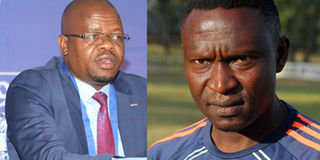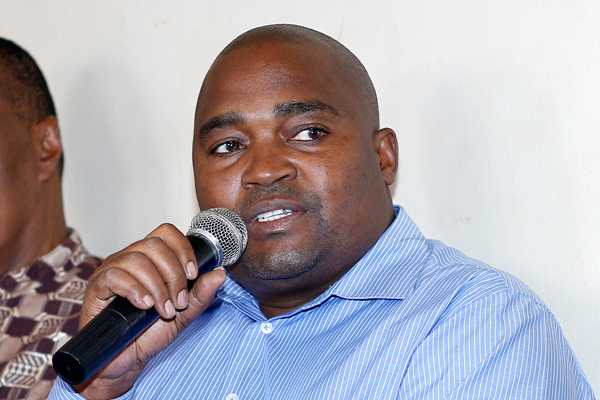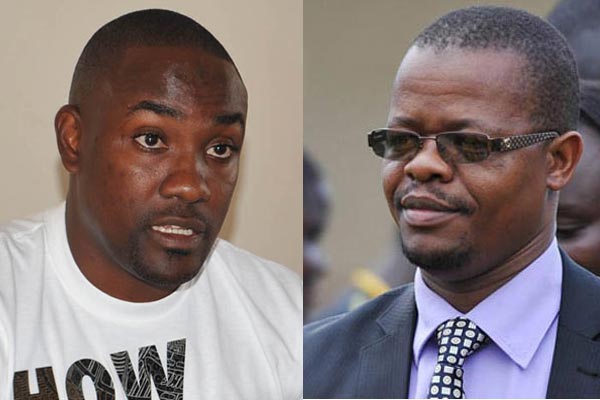Prime
Once a ‘federation darling’, KCCA now at loggerheads with Fufa

Fufa supremo Moses Magogo (left) and KCCA manager Morley Byekwaso (right). PHOTOS/FILE
What you need to know:
- Fallout. KCCA have recently found themselves wagging stiff fingers at Fufa.
February is supposed to be a month of love. As smitten couples are gearing up for Valentine’s Day in two days, KCCA and Fufa are estranged lovers.
The two are reading from different scripts after years of enviable bondage.
To-date, irate KCCA administrators still view Fufa’s verdict to have the aborted match with Onduparaka replayed as a penance too hard to take. It became a bitter pill to swallow after the resultant replay at Bombo last week produced a 1-all draw that put paid to KCCA’s StarTimes Uganda Premier League leadership.
Before that, Fufa were always accused of backing from the Kasasira Boys whenever faced with a league conundrum.
This rosy bromance gained more attention between 2015 and 2018 when Jennifer Musisi was the KCCA Executive Director, Julius Kabugo steering the chairmanship wheel and Mike Mutebi conjuring trophy success on the field of play.
It’s then that Fufa threw around praises, labeling KCCA as the ‘model club.’ The club would get their way after the infamous Ntungamo Uganda Cup final in 2015. Many had pinned KCCA as culpable in the premature match stoppage but Fufa ordered a replay with Villa at Namboole, which KCCA lost 3-0.
Muhoozi talks Cas
The battle lines have been drawn according to Anisha Muhoozi, the KCCA chief executive. She unusually talks tough but she just not about to relent.
“We are professionals and know that disagreements are part of life. Everything will go on only normally after the Onduparaka incident but just know that this time we are not on the same page with the federation,” Muhoozi said.
“As a club we are still exploring other options on the matter of whether to go to the Court of Arbitration for Sport (CAS). We are still deliberating our next course of action.”
Cas facilitates settlement of sports disputes through arbitration or mediation.
Muhoozi stresses that they have no quarrel with Onduparaka but Fufa, adding that they have had less publicised fights with the federation, especially on the ruling that deprived them of the services of youngsters Ismail Mugulusi and Oscar Mawa (both at Villa now) and the prolonged war with Vipers over Andrew Kawooya.
“We have always tried to be diplomatic when dealing with Fufa because we are a model club. We have always had our fights with Fufa just that we had not come out openly. It is not true when they say KCCA have always been in bed with Fufa. Apart from the said player transfer conflicts, we have complained about refereeing decisions and they did nothing. It’s only now with a wider uproar that they have started to act,” she added.
KCCA’s ire can also be traced to the federation banning of Ashraf Mugume, Innocent Wafula, Ramathan Musa and Sadat Anaku for two matches for remonstrating with an assistant referee during the 1-all draw with Vipers in December.
Why the sudden divorce?
With time, the administrative changes at KCCA have brought on board new characters with a different approach.
Fufa tended to bend when erstwhile administrators like John Mutenda, Godfrey Kisekka, Patrick Isiagi or Ahmed Midi Juma spoke. Not any more. That, coupled with the reported pressure from top leadership at the club to win this year’s league trophy at all costs, has seen KCCA treat with paranoia anyone deemed to impede their bid.
The 13-time league winners last hoisted the trophy in 2019 and have flattered to deceive since despite being one of the biggest spenders annually.
‘A historic, healthy conflict’
UPL board member Peter Kibazo, a KCCA fan and former club administrator, is less surprised by the ongoing bickering between the two entities.
“If Kindeed there is any ongoing conflict, it is a very healthy one for Ugandan football,” Kibazo said.
He recalled the turbulent times in the early 90s that saw KCCA and Villa fight for school players that didn’t go well with the Villa Park faithful after the Lugogo side appealed to Fufa.
“The regrettable bickering ended in chaos. It was also attributed to the subsequent killing of Fufa official and former KCCA star Moses Nsereko, led to banning of Jogoo skipper Paul Hasule and Villa players abandoning the Cranes.
“One time, KCCA chairman Jack Ibaale barred KCCA from playing Express, we lost a league title just like that,” he said.
Back in 1982, top flight clubs formed the Super Division Clubs Association (SDCA) as a frontline to take on the federation excessive force and dictatorial tendencies. Over time the subsequent federation regimes neutralised the power of SDCA - first to fight off officials with Fufa presidency ambitions and, secondly, to tame the power of a united front.
As such, KCCA were among the big clubs that failed to back smaller clubs when they demanded to know how they would benefit from the Shs26b 10-year StarTimes league sponsorship package.
KCCA, along with URA, were also inaudible when Covid-ravaged clubs cried out to Fufa for relief.
UPL plots ceasefire pact
The UPL Secretariat that replaced SDCA has over the years been accused of being influenced by the federation.
Bernard Bainamani, the league chief executive, said they believe the Fufa Appeals Committee and Disciplinary Panel do their job objectively.
“In football every decision, on and off the pitch, is protested but you need to know one has to lose and others gain.
“Irrespective of who is right or wrong, the reported wrangle impacts us as the organisers because it affects the brand we sell to the world,” he said.
“We condemn hooliganism and we believe the punishments meted out to offenders (in the KCCA vs. Onduparaka case) and the replay healed most of the wounds. We’ll talk to KCCA and resolve the brewing bad blood, if any.”
Fufa communications director Ahmed Hussein Marsha subtly played down the souring relationship.
“We’re chasing our Hat-trick strategy (create a professional industry, take the game to grassroots, and create a sporting industry). We’re giving priority to ‘heavyweight issues’ at the moment,” he said.





